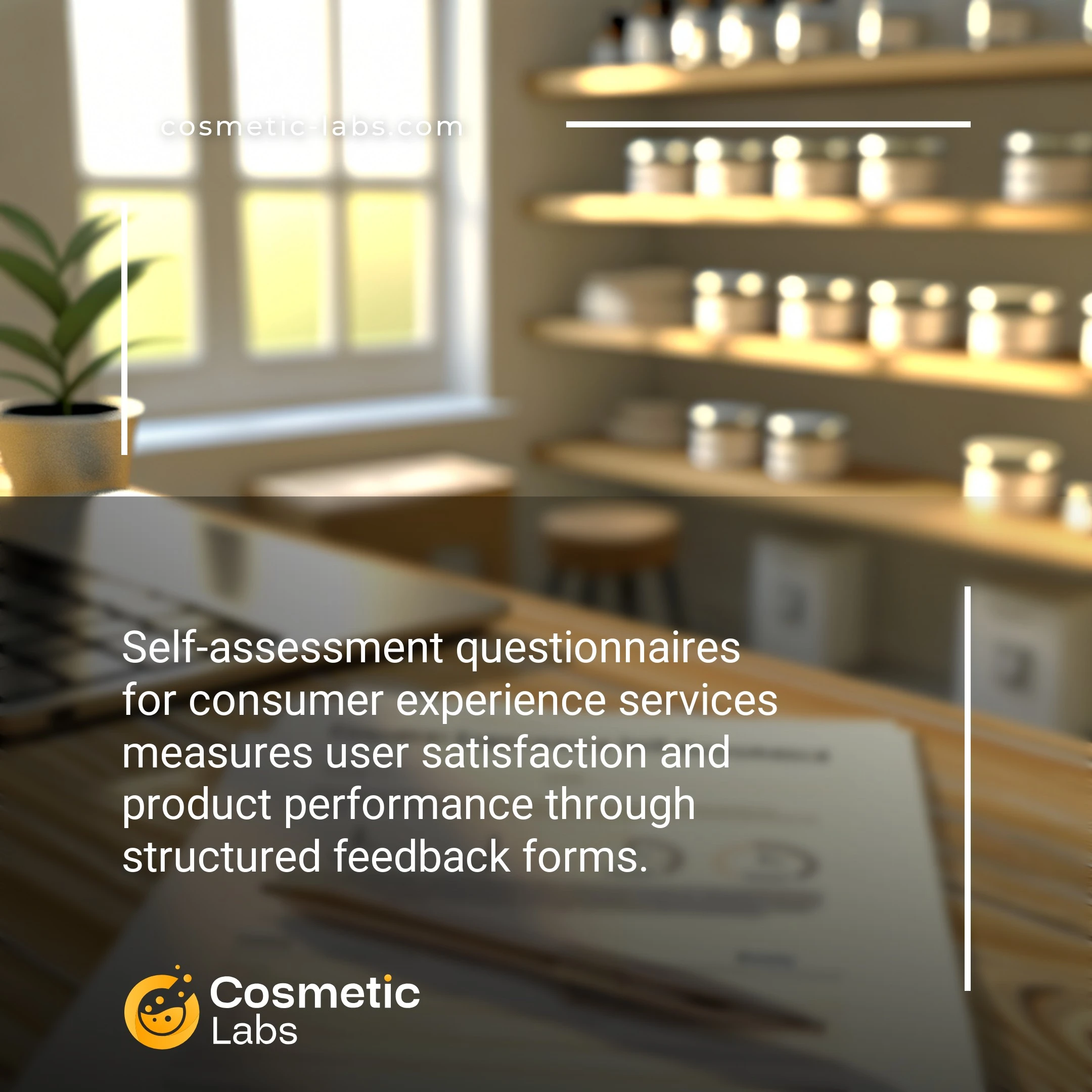Consumer Experience Testing: Lab Self-Assessment Tools

What is Self-assessment questionnaires?
Self-assessment questionnaires for consumer experience services are structured evaluation tools that cosmetic labs use to measure consumer satisfaction and product performance during clinical testing phases. These digital surveys capture real-time feedback on texture, application ease, and sensory attributes from test participants, allowing our partner laboratories to refine formulations before market launch and provide you with data-driven insights for your beauty products.
Why do you need this service?
Cosmetic labs deploy consumer experience self-assessment questionnaires to capture real-world product performance data during clinical trials and post-launch monitoring phases. Beauty brands receive structured feedback on texture preferences, application ease, and sensory satisfaction that directly informs reformulation decisions and reduces costly product iterations by 30-40% before market launch.
Who provides Self-assessment questionnaires services?
All cosmetic labs providing Self-assessment questionnaires services
There is no company providing these services at the moment.
Consumer Experience Assessment Tools for Cosmetic Products
Self-assessment questionnaires for consumer experience services help cosmetic labs gather structured feedback about product performance, user satisfaction, and sensory attributes. These standardized evaluation tools provide brands with quantifiable data to validate formulations and guide product improvements before market launch.
Structured Feedback Collection Methods
Labs design custom questionnaires that capture specific product attributes relevant to your target market. These tools measure texture preferences, application ease, scent acceptability, and overall user satisfaction through standardized rating scales.
Common assessment categories include:
- Sensory evaluation (texture, absorption, residue)
- Performance metrics (moisturizing effect, coverage, longevity)
- User experience factors (packaging convenience, application method)
- Purchase intent and brand perception
Data Analysis and Reporting Services
Professional labs analyze questionnaire responses using statistical methods to identify patterns and preferences within your target demographic. They provide detailed reports that highlight strengths, weaknesses, and areas for formulation optimization.
Results typically include preference percentages, demographic breakdowns, and comparative analysis against competitor products. This data supports regulatory submissions and marketing claims while reducing the risk of product failure after launch.
Partner with experienced cosmetic labs on our platform to access proven consumer testing methodologies that deliver actionable insights for your product development strategy.
Practical Applications of Consumer Experience Self-Assessment Questionnaires
Cosmetic labs use consumer experience self-assessment questionnaires to gather quantifiable feedback data that drives product refinement and regulatory documentation across multiple development phases.
Product Development and Formulation Optimization
Labs deploy structured questionnaires during prototype testing to capture user reactions to texture, absorption rate, and sensory attributes. These assessments typically include 5-point Likert scales measuring product feel, application ease, and immediate skin response within 24-48 hours of use.
Formulation teams analyze response patterns to identify specific ingredient adjustments needed before final production. For example, if 70% of participants rate moisturizer absorption as “too slow,” chemists modify emulsifier ratios or add penetration enhancers.
| Assessment Category | Measurement Method | Typical Response Time | Data Application |
|---|---|---|---|
| Texture Evaluation | 7-point tactile scale | Immediate post-application | Rheology adjustments |
| Skin Compatibility | Visual analog scale | 24-hour follow-up | Ingredient screening |
| Usage Preference | Comparative ranking | 7-day trial period | Market positioning |
| Purchase Intent | Binary choice + price point | Post-trial interview | Commercial viability |
Clinical Claims Validation and Regulatory Support
Consumer questionnaires provide subjective efficacy data that supports cosmetic claims and regulatory submissions. Labs structure these assessments to meet FDA cosmetic guidelines and international standards for consumer perception studies.
Participants complete baseline questionnaires before product use, then follow-up assessments at predetermined intervals (typically 2, 4, and 8 weeks). This data helps brands substantiate claims like “visibly reduces fine lines” or “improves skin hydration” with statistically significant consumer-reported outcomes.
Ready to implement consumer experience assessments for your next product launch? Connect with experienced cosmetic labs on our platform to design questionnaires that deliver actionable insights for your formulation and claims strategy.
